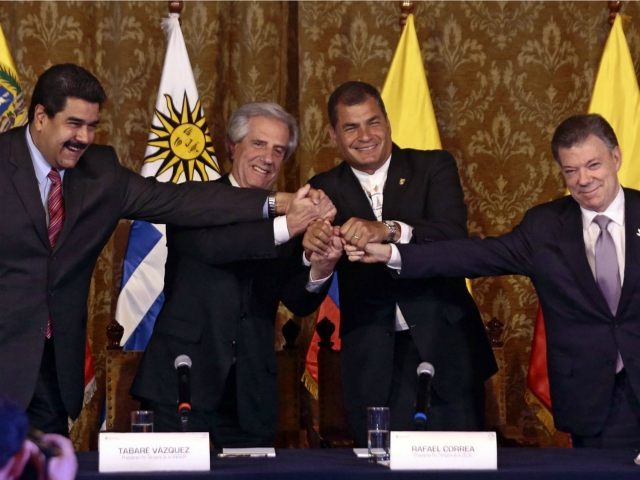A much-publicized summit between Venezuelan head of state Nicolás Maduro and his Colombian counterpart Juan Manuel Santos to reestablish diplomatic relations following the mass deportations of Colombians without due process in socialist Venezuela has not resulted in a concrete solution regarding the fate of the forcibly displaced.
Santos and Maduro arranged a meeting in Quito, the capital of Ecuador, mediated by that nation’s president, Rafael Correa, and Uruguay’s Tabaré Vázquez, who now also heads the Organization of American States. The two heads of state agreed on a series of actions to begin the “progressive normalization” of relations, which began by officially restoring ties through the return of ambassadors to both nations.
Other than the return of their respective ambassadors, the seven-point plan announced by President Correa provided few details. The other six points in the plan are: to “investigate the situation on the border”; immediately schedule a meeting between foreign ministers; the “progressive normalization” of the Colombia-Venezuela border; the “coexistence of economic models”; “a call to the spirit of brotherhood and unity”; and the continued presence of Ecuador and Uruguay.
Venezuela’s Maduro applauded the talks. “Common sense has triumphed,” he said of the meeting, “dialogue and what should always prevail: peace between our nations.” Santos described the talks as “a serene dialogue, respectful and productive, and it pleases me very much to reestablish such dialogue with Venezuela.”
Santos is facing heavy criticism within Colombia for participating in the talks, not the least because no resolution regarding the deported Colombians who now find themselves homeless has surfaced. More than 20,000 Colombians previously living on the Venezuelan side of the border have been displaced, nearly 2,000 violently expelled from their homes and torn away from their families. Men, women, and children have all claimed to have been sexually assaulted by Venezuelan soldiers during the deportations.
Colombian politicians and journalists have expressed outrage at the lack of solutions regarding these individuals. Álvaro Uribe, former head of state and current Colombian senator, condemned Santos on Twitter, listing a number of issues yet to be resolved: “1. the reopening of the border, 2. the separated families, 3. Venezuela violating Colombian airspace.” “Santos understands Venezuela’s position and decided to work together [on] the problems,” he added.
Former Conservative Party presidential candidate Marta Lucía Ramírez echoed these concerns, calling the talks “disappointing.” “Colombians in Venezuela should have gotten at least the guarantee that they [Venezuela] will not keep persecuting them, that their homes will not be marked, that the will not continue to be expelled,” she lamented.
César Gaviria Trujillo, another ex-president, has organized a summit of former heads of state on Wednesday to independently solve the problems left unresolved by Santos and Maduro. Uribe will be there, as well be former president Andrés Pastrana. “Marking the homes of Colombians like Maduro did is an abominable Nazi custom that the Venezuelan president wants to impose on Latin America,” Trujillo said, referring to the Venezuelan military’s use of the letter “D” to mark the homes of those deported (hence the letter), to later be turned into government property along with all the belongings left inside. In a speech earlier in the month, Santos also referred to this practice as a “Nazi ghetto tactic.”
Some deem the human rights violations against Colombians a natural development regarding Venezuela, given that, after Uribe’s tenure, the nation became far less vocal against the violent socialist regime of its neighbor. El Tiempo columnist Carlos Arevalo compares that silence to Europe’s in the face of Nazi Germany, writing, “one of the lessons Colombians– and especially the government– must take from this is the high cost of silence in the face of its neighbor… [by the time] they came for the Colombians, the [Colombian] government could not expect the international community to speak up.”

COMMENTS
Please let us know if you're having issues with commenting.